- A good example of the glorification of war as 'fun' or glamorous is the play, Oh! What a lovely war, produced by Joan Littlewood, and then made into a musical film released in 1969. The film was described by Variety magazine as, "dedicated, exhilarating, shrewd, mocking, funny, emotional, witty, poignant and technically brilliant."
- Children play cowboys and Indians, or cops and robbers, or just one group (gang) against another.
Adults play paintball. They enjoy this, and like other warlike actions - uniforms, weapons, drills, films, books, comics, and so on.
- Shakespeare recognised this, as expressed in the well-known speech in the play, Henry V, just before the Battle of Agincourt (1415) :
For he to-day that sheds his blood with me
Shall be my brother; be he ne'er so vile,
This day shall gentle his condition;
And gentlemen in England now a-bed
Shall think themselves accurs'd they were not here,
And hold their manhoods cheap whiles any speaks
That fought with us upon Saint Crispin's day
- Young men are told they are heroes if they follow orders and kill the enemy. If they do not, they are accused of treason and even killed by their 'own' side.
- Humans can be encouraged to be violent to one another. In the well-known Milgram Experiment, participants were encouraged to 'inflict' ever increasing electric shocks as punishment to supposed wrong doers, despite those being shocked acting with ever greater pain.
The experiment was done under the supervision of supposed authorities dressed in white medical coats.
- Humans can communicate between countries, between continents. Chimpanzees communicate within a forest, a 'territory'.
- It is all too easy to encourage (to get) groups to identify themselves as part of a particular following, and to involve themselves in wars or other social contentions.
Stalin, for example, worked to shift Polish people living in Ukraine back to Poland, while shifting Ukrainians living in Poland back to Ukraine, and many other such vanities. Much detail can be found in Bloodlands by Timothy Snyder.
- Thus, politicians have worked to establish religions that demand the whole population subscribe to one creed or another. Stirring speeches that encourage enthusiasm and other emotions come to mind, such as those made by Hitler and his acolyte Oswald Mosley.
- There are two human tendencies:
- emotion-based - are you excited?
- rational-based - stop, think, act.
- The emotional type enjoys wars, football matches, arguments, competing, excitement.
- The logical type prefers studying, engineering, chess, or go.
- Habits are a good part of what we are. Habits can be a short cut, the easy way to solving real or apparent problems, rather than more slowly analysing and finding a more sensible, and more long-lasting, solution to problems.
Excitement, a socially generated hysteria? - Humans are encouraged to compete, as in football matches, for instance.
- Nowadays, children are encouraged to be excited during activities. Roller-coasters are sold on how exciting they are.
- People who are emotional are much easier to manipulate. For example, female prison officers, physically smaller and weaker, and now often much younger and inexperienced in life, can be led into acts that are illegal in prison, and even unwise.
- 50, 60, 70 years ago, this incitement to being excited, not in control of emotions and associated 'wild' behaviours, did not occur so widely.
Children, by and large, were expected to have a calm demeanour; yes to laugh, to squeal at something unexpected, but then to return to their normal calm, steady state.
Putting children in situations where they are screaming from fear is not amusing or 'cute', nor is convincing them that their response is part of 'fun'. Fear provokers include roller-coasters and similar; Halloween ghosts, witches and zombies; staying up for adult films/movies. This results in an agitated person, habitually mis-responding to situations with hysteria rather than thought.
This can also be seen in badly trained dogs, barking, jumping about for attention, and attacking objects moving into their sight.
- Politicians act in their own interests, as does the common man.
- That is, politicians use that propensity of the common man to serve in their own interests to further the interests of the politician.
- Politicians try to get all peoples in their realms to speak in common languages, and hold the same sets of irrational beliefs.
- Thus, if politicians become unpopular at home, they will seek to turn the local population against some common enemy abroad.
Politicians tend to sweep aside rational voices by encouraging the mob to irrationalism.
how clever do you think you are, or metacognition
- It is known that many people tend to think they are more capable than they are in reality. This is particularly so with those who are "less skilled", who have a lower IQ level. Formalised by researchers Dunning and Kruger (the Dunning-Kruger effect), this cognition bias causes those affected to wrongly overestimate their knowledge or ability in a specific area. Their lack of self-awareness stops them from accurately assessing their own abilities.
- A person who believes themself to be more capable than they are has a similar attitude to a person who believes in Just-So Stories.
- Most people do not deal with the real world.
They deal with a combination of Just-So Stories and being over-confident of their own abilities to assess and handle real-world events and problems.
- Being over-confident, they seek out sources that accord with their learnt beliefs (confirmation bias). This stops a person learning new skills or facts, as they already know (or rather, they think/believe they know).
Over-confidence stops a person recognising and correcting mistakes.
- Religions tend to include unquestioned, dogmatic beliefs.
physical origins and connections with human behaviour
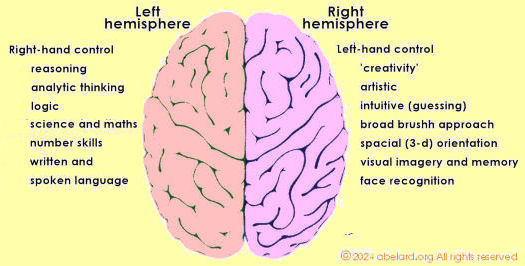 the two hemispheres of the brain,
with behavioural attributes
the two hemispheres of the brain,
with behavioural attributes
(simplified diagram, view from above)
Logical or emotional brain?
Lateralisation, according to common views - The left brain is associated with logic, analytical thinking, and language processing, while the right brain is linked with creativity, intuition, and holistic thinking.
However, this is an oversimplification, as both hemispheres cooperate and negotiate in most activities.
According to the left-brain, right-brain dominance theory/lateralisation, the left side of the brain is considered to be adept at tasks that are considered logical, rational, and calculating. Others prefer to 'think' of the brain as many sub-units.
By contrast, the right side of the brain is best at artistic, creative, and spontaneous tasks (Corballis, 2014; Joseph, 1988).
- The left brain can be seen as an analyst, breaking apart concepts into smaller, manageable chunks. By contrast, the right brain can be seen as a synthesist, developing a more cohesive view (McGilchrist, 2019).
The left brain largely receives connections from the parasympathetic system ( 'feed and breed' and 'rest and digest' responses), while the right brain largely receives connections from the sympathetic ('fight or flight' )
instinctual system (Conesa 1995).
Together, the two halves of the brain work with the rest of the nervous system to maintain a homeostatic balance in any single person
- The brain's tissue volume can be increased, and cognitive skills such as visual memory can be improved, by stimulation with complex patterns and activities such as listening to classical music, even Mozart, or by learning to play a musical instrument. The younger the person when they start this kind of study, the greater the effect on the brain's capacity. These activities may also help to delay cognitive decline.
Sympathetic and parasympathetic nervous systems - The autonomic nervous system controls specific body processes, working autonomously, that is without a person’s conscious effort. The autonomic nervous system is made up of the sympathetic and the parasympathetic autonomic nervous systems, regulating, for instance, breathing and metabolism.
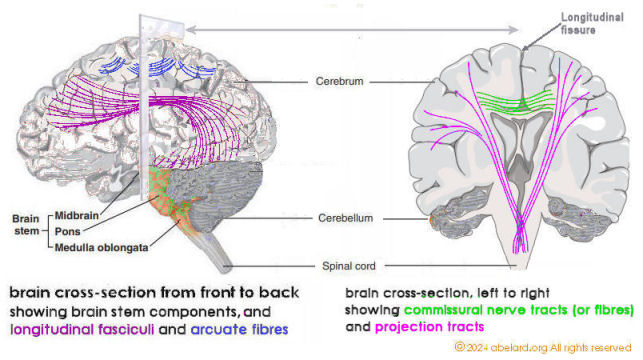 brain cross-sections, showing brain components
brain cross-sections, showing brain components
(simplified diagram: view from side, and cut-through left to right)
- The Sympathetic Autonomic Nervous System (SANS) is situated near the thoracic (chest) and lumbar (lower back) regions in the spinal cord, comprising cell bodies that lie within the grey column of the spinal cord. It prepares the body for the 'fight or flight' response during any potential danger by, primarily, regulating the heart rate, respiration rate, and pupillary response.
- The Parasympathetic Autonomic Nervous System (PANS) sits between the spinal cord and the medulla, at the base of the skull,
and is made up of cranial and spinal nerves. The PANS inhibits the body from overworking and restores the body to a calm and composed state, providing 'feed and breed' and 'rest and digest' responses.
- The two sides of the brain are connected together by several components called 'commissural nerve tracts' (or fibres),the largest bundle being the corpus callosum. Commissural fibres connect the corresponding areas of both cerebral hemispheres.
advertisement
- I am accord with Tolstoy's view that wars happen to people, people do not set out make wars. This is other than lunatics like Hitler and Putin who try to grab territory from other groups. Then war is a natural consequence.
People do not like losing territory and, therefore, tend to fight back.
- Go forth and multiply is god's recommendation (Genesis 1:28). This is a very short-term suggestion when faced with geometric progressions. A short-term proposal that makes for a long-term cause of war.
See Jared Diamond on Rwanda, or even Malthus.
- The causes of war are deeply embedded in the nature of humans and the limited resources of our present planet, quite apart from the simplistic, crude references to 'greed'.
people who can and people who imagine they can
- The world is full of people who cannot do anything, but who want to tell people who can do something what to do and even how to do it.
- People who act in this manner form a large proportion of society.
Note that they behave according to Dunning and Kruger, that is they also make up Just-So Stories, or perhaps you will prefer the words, "they're just plain wrong".
- All explications are just word soup, they do not actually accord with reality.
- Ethics is a matter of personal responsibility and personal accountability.
It is sensibly driven by reason, and only by reason.
- A German is not responsible for Nazism, nor a Muslim for terrorism; unless and until he points it at an 'enemy' and starts shooting.
- To join with the mad gang or team or religion, unless on an individual and reasoned basis, is to give up judgement and loose oneself in a mob or a herd of Gadarene swine.
- The mob is irrational, and lacks judgement and responsibility.
- "Only an intellectual could believe such nonsense." George Orwell.
- The Malthusian argument : a human society free of coercive restraints is an impossible ideal because the threat of population growth is always present. Uncontrolled increases in population take place in a geometric progression, while the means of subsistence [food] increases in an arithmetic progression. A good, sound society’s population, therefore, will always expand to the limit of food supply. See also understanding a species under stress.
- It is surprisingly easy for an intellectual to convince themselves that the world would be a lot better off if things were tidier and there were less poor people.
- Morals or ethics of a group are the life of the mad.
- Given the above, and given the madness of humans who currently have a great concern about the planet,
I can see groups of clever monkeys deciding that nuclear war would be an attractive option.
This is once they work out that the dust in the air would reduce global warming and mitigate the terror of population overload.
bibliography
In the Shadow of Man by Jane van Lawick-Goodall (Author), Hugo van Lawick (Photographer)
On Goodall's first ten years among the chimpanzees of Gombe, Tanzania. |
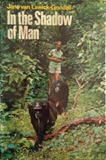 |
HarperCollins Distribution Services; first edition, 1971, hbk
ISBN-10 : 0002113570
ISBN-13 : 978-0002113571
amazon.com {advert}
£2.49 [amazon.co.uk] {advert{a |
Weidenfeld & Nicolson, 1999, pbk
ISBN-10 : 0753809478
ISBN-13 : 978-he point
$10.07 [amazon.com] {advert}
£8.15 [amazon.co.uk] {advert} |
|
Kindle edition
Weidenfeld & Nicolson, 2010
ASIN B004JHY95M
£2.99 [amazon.co.uk] {advert} |
|
Through a Window: My Thirty Years with the Chimpanzees of Gombe by Jane Goodall
Continuing the story of being among the chimpanzees of Gombe, Tanzania. |
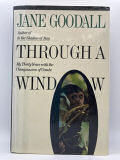
|
Houghton Mifflin, 2010, hbk
(First published 1990)
ISBN-10 : 0395500818
ISBN-13 : 978-0395500811
$22.03 [amazon.com] {advert}
amazon.co.uk {advert} |
Weidenfeld & Nicolson, 2020, pbk
ISBN-10 : 1474615821
ISBN-13 : 978-1474615822
$12.73 [amazon.com] {advert}
£19.00 [amazon.co.uk] {advert} |
|
Kindle edition
Mariner Books, 2010
ASIN: B004H1UEXG
$11.85 [amazon.com]{advert |
|
| Oh! What a lovely war |
 |
Film released 1969
DVD, 2007;
2 hours 18 mins
$10.43 [amazon.com] {advert{advert}
ASIN : B000NJLQHY
£14.99 [amazon.co.uk] {advert
ASIN : B01F4659L4 |
|
|
|
| Bloodlands by Timothy Snyder |
 |
Basic Books, 2010, hbk
ISBN-10 : 0465002399
ISBN-13 : 978-0465002399
ASIN : 0465002390
$31.70 [amazon.com] {advert{advert}
amazon.co.uk{advert} |
Basic Books, 2022, pbk
- ISBN-10 : 1541600061
- ISBN-13 : 978-1541600065
$17.99 [amazon.com] {advert}
amazon.co.uk{advert} |
Kindle edition
Basic Books, 2012
$15.99 [amazon.com] {advert}
ASIN : B00B3M3VE6
*
Vintage Digital, 2011
£6.99 [amazon.co.uk] {advert}
ASIN : B005G37SBK |
|
| The Otterbury incident by C. Day Lewis (1904-1972) |
 |
First published 1948, pbk
G. P. Putnam's Sons
- ISBN-10: 0547488387
- ISBN-13: 978-0547488387
$12.73 [amazon.com] {advert{advert}
£19.00 [amazon.co.uk] {advert} |
|
|
| |
Collapse (How Societies Choose to Fail or Succeed) by Jared Diamond 
(In particular see chapter 10.) |
 |
Penguin Group USA Inc, 2004, hbk
 $18.89 [amazon.com] {advert} $18.89 [amazon.com] {advert}
Viking Press, 2004, hbk
£19.98 [amazon.co.uk] {advert}
- ISBN-10 : 0670033375
- ISBN-13 : 978-0670033379
Penguin Books, 2011, pbk,
$13.59 [amazon.com] {advert}
£21,18 [amazon.co.uk] {advert}
- ISBN-10 : 0143117009
- ISBN-13 : 978-0143117001
|
kindle
Penguin, 2013
$13.08 [amazon.com] {advert}
ASIN : B00BQOC4X0
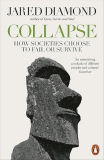
audio cd
Penguin Group USA, 2004
£1.30 [amazon.co.uk] {advert}
- ISBN-10 : 0143057189
- ISBN-13 : 978-0143057185
|
end notes
- Through a Window: My Thirty Years with the Chimpanzees of Gombe, 2020, p. 127.
-
-
- “For so many years I had believed that chimpanzees, while showing uncanny similarity to humans in many ways, were, by and large, rather ‘nicer’ than us. Suddenly I found that under certain circumstances they could be just as brutal”, explained Goodall, “...they also had a dark side to their nature.”
Jane Goodall, 1974–1978 Gombe Chimpanzee War in her 1990 memoir, Through a Window: My Thirty Years with the Chimpanzees of Gombe.
- Oh what a lovely war, A satirical view on the First World War. This was first produced on stage by Joan Littlewood in 1963. It was later made into a musical film, written by Len Deighton, Brian Duffy, and directed by David Attenborough, issued in 1969.
- Variety (magazine), "Oh! What a Lovely War", 16 April 1969. p. 6.
-
- From Henry V, Act IV, Scene III.
-
- From 1963, Stanley Milgram, a psychologist at Yale University, conducted an experiment investigating the conflict between obedience to authority and personal conscience. The experiment created was to see whether Germans were particularly obedient to authority figures, as this was a common explanation for the Nazi killings in World War II, or whether this behaviour also occurs with other people.
-
- Musical training, neuroplasticity and cognition
-
- cognition: knowledge including its collection by perception, rather than through feeling or willing.
- Why so many female guards are having sex in jail with prisoners , article in the Daily Mail, 23 April 2024.
"The minimum entry age of recruits has dropped from 21 when Vanessa joined the prison service to just 18"
...
'If you are a 19 or 20-year-old 5ft 4in woman, you won't have the confidence or presence to challenge these guys and they will see you as more pliable and easier to manipulate than a seasoned officer. It's the cold hard truth.'
"Previously many officers in the tough prisons were ex-Armed Forces, who had a lot of real-life experience and were not easily intimidated,' says Officer A, who left the system seven years ago after ten years working in the north-east of England.
" 'But then they [started to] hire far more people straight out of school who were keen but lacked the confidence to deal with cunning, hardened criminals.
...
" 'You cannot show a single chink in your armour, or you are finished,' she says.
'I would warn recruits to never even speak about their personal life on the landings because prisoners would listen in and use this stuff against you.
'It might start off with something small; they might challenge you to a game of pool and say the winner gets a Mars Bar. Of course, you can't give them chocolate and if you do then you've broken the rules, and they've got you.
'The squeeze will begin. The next thing is they will ask 'can you bring this in for me' and the whole thing escalates from there.'
Once one boundary is crossed, others quickly follow and the power dynamic shifts from officer to prisoner. 'The key thing is the inmate has nothing to lose — they are already in prison,' says Officer B.
'Whereas for the prison officer, their entire life is on the line."
- “And God blessed them, and God said unto them, Be fruitful, and multiply, and replenish the earth, and subdue it: and have dominion over the fish of the sea, and over the fowl of the air, and over every living thing that moveth upon the earth.”
Genesis 1:28; The Bible, King James Version (KJV)

|






















